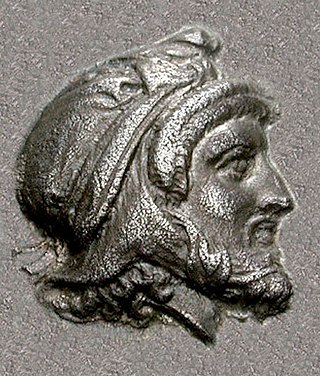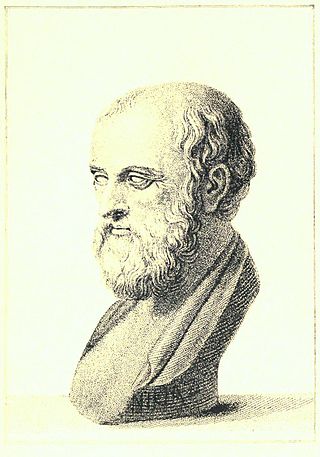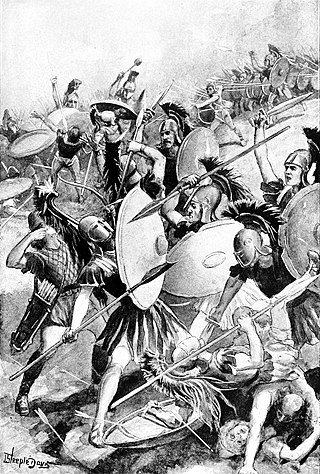Related Research Articles

The Peloponnesian War was an ancient Greek war fought between Athens and Sparta and their respective allies for the hegemony of the Greek world. The war remained undecided for a long time, until the decisive intervention of the Persian Empire in support of Sparta. Led by Lysander, the Spartan fleet, built with Persian subsidies, finally defeated Athens and started a period of Spartan hegemony over Greece.

The 5th century BC started the first day of 500 BC and ended the last day of 401 BC.
Year 404 BC was a year of the pre-Julian Roman calendar. At the time, it was known as the Year of the Tribunate of Volusus, Cossus, Fidenas, Ambustus, Maluginensis and Rutilus. The denomination 404 BC for this year has been used since the early medieval period, when the Anno Domini calendar era became the prevalent method in Europe for naming years.

This article concerns the period 409 BC – 400 BC.
This article concerns the period 429 BC – 420 BC.
This article concerns the period 399 BC – 390 BC.

Alcibiades was an Athenian statesman and general. The last of the Alcmaeonidae, he played a major role in the second half of the Peloponnesian War as a strategic advisor, military commander, and politician, but subsequently fell from prominence.
Year 412 BC was a year of the pre-Julian Roman calendar. At the time, it was known as the Year of the Consulship of Ambustus and Pacilus. The denomination 412 BC for this year has been used since the early medieval period, when the Anno Domini calendar era became the prevalent method in Europe for naming years.
Year 413 BC was a year of the pre-Julian Roman calendar. At the time, it was known as the Year of the Consulship of Cossus and Medullinus. The denomination 413 BC for this year has been used since the early medieval period, when the Anno Domini calendar era became the prevalent method in Europe for naming years.
Year 415 BC was a year of the pre-Julian Roman calendar. At the time, it was known as the Year of the Tribunate of Cossus, Vibulanus, Volusus and Cincinnatus. The denomination 415 BC for this year has been used since the early medieval period, when the Anno Domini calendar era became the prevalent method in Europe for naming years.
Year 418 BC was a year of the pre-Julian Roman calendar. At the time, it was known as the Year of the Tribunate of Fidenas, Axilla and Mugillanus. The denomination 418 BC for this year has been used since the early medieval period, when the Anno Domini calendar era became the prevalent method in Europe for naming years.

Theramenes was an Athenian military leader and statesman, prominent in the final decade of the Peloponnesian War. He was active during the two periods of oligarchic government at Athens, the 400 and later The Thirty Tyrants, as well as in the trial of the generals who had commanded at Arginusae in 406 BC. A moderate oligarch, he often found himself caught between the democrats on the one hand and the extremist oligarchs on the other. Successful in replacing a narrow oligarchy with a broader one in 411 BC, he failed to achieve the same end in 404 BC, and was executed by the extremists whose policies he had opposed.

Pharnabazus II was a Persian soldier and statesman, and Satrap of Hellespontine Phrygia. He was the son of Pharnaces II of Phrygia and grandson of Pharnabazus I, and great-grandson of Artabazus I. He and his male ancestors, forming the Pharnacid dynasty, had governed the satrapy of Hellespontine Phrygia from its headquarters at Dascylium since 478 BC. He married Apama, daughter of Artaxerxes II of Persia, and their son Artabazus also became a satrap of Phrygia. According to some accounts, his granddaughter Barsine may have become Alexander the Great's concubine.

Nicias was an Athenian politician and general during the period of the Peloponnesian War. Nicias was a member of the Athenian aristocracy and had inherited a large fortune from his father, which was invested in the silver mines around Attica's Mt. Laurium. Following the death of Pericles in 429 BC, he became the principal rival of Cleon and the democrats in the struggle for the political leadership of the Athenian state. He was a moderate in his political views and opposed the aggressive imperialism of the democrats. His principal aim was to conclude a peace with Sparta as soon as it could be obtained on terms favourable to Athens.
The Battle of Cyzicus took place in May or June 410 BC during the Peloponnesian War. During the battle, an Athenian fleet commanded by Alcibiades, Thrasybulus, and Theramenes routed and destroyed a Spartan fleet commanded by Mindarus. The victory allowed Athens to recover control over a number of cities in the Hellespont over the next year. In the wake of their defeat, the Spartans made a peace offer, which the Athenians rejected.

The Sicilian Expedition was an Athenian military expedition to Sicily, which took place from 415–413 BC during the Peloponnesian War between Athens on one side and Sparta, Syracuse and Corinth on the other. The expedition ended in a devastating defeat for the Athenian forces, severely impacting Athens.

The History of the Peloponnesian War is a historical account of the Peloponnesian War, which was fought between the Peloponnesian League and the Delian League. It was written by Thucydides, an Athenian historian who also served as an Athenian general during the war. His account of the conflict is widely considered to be a classic and regarded as one of the earliest scholarly works of history. The History is divided into eight books.

Demosthenes, son of Alcisthenes, was an Athenian general during the Peloponnesian War.

Classical Greece was a period of around 200 years in Ancient Greece, marked by much of the eastern Aegean and northern regions of Greek culture gaining increased autonomy from the Persian Empire; the peak flourishing of democratic Athens; the First and Second Peloponnesian Wars; the Spartan and then Theban hegemonies; and the expansion of Macedonia under Philip II. Much of the early defining politics, artistic thought, scientific thought, theatre, literature and philosophy of Western civilization derives from this period of Greek history, which had a powerful influence on the later Roman Empire. Part of the broader era of classical antiquity, the classical Greek era ended after Philip II's unification of most of the Greek world against the common enemy of the Persian Empire, which was conquered within 13 years during the wars of Alexander the Great, Philip's son.
Astyochus or Astyochos was a Spartan navarch who served as commander of the collective Spartan naval forces along the coast of Asia Minor during 412–411 BC. He is regarded by many contemporaries and modern scholars as a key reason for Sparta's early failures in the Peloponnesian War. His expeditions consisting of encounters in Lesbos, Chios, Erythrae and Clazomenae all of which proved unsuccessful. He refused requests for help from Chios, causing the Spartan administration to become increasingly dissatisfied with his leadership. Thucydides portrayed Astyochus as timid and inept, and also depicted him as often in conflict with his peers in Ionia. Toward the end of his time as commander, he exhibited great reluctance to attack the Athenians and also failed to properly pay his troops, leading to riots and violence, and eventually, his removal as commander in 412 BC, to be replaced by the Spartan Mindarus.
References
- ↑ Durnerin, Marie; AMPAH 2019 (2019-01-01). "The risk of open voting. Army, assembly and fake news at the end of the Sicilian Expedition".
- ↑ Thucydides. History of the Peloponnesian War.
- ↑ Vanessa B. Gorman (2001). Miletos, the ornament of Ionia: history of the city to 400 BCE. University of Michigan Press. p. 122. ISBN 978-0-472-11199-2.